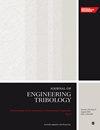Failure analysis and numerical simulation of the regulating valve with particle erosion and cavitation erosion in the black-water treatment system
IF 1.6
3区 工程技术
Q3 ENGINEERING, MECHANICAL
Proceedings of the Institution of Mechanical Engineers, Part J: Journal of Engineering Tribology
Pub Date : 2024-06-06
DOI:10.1177/13506501241259898
引用次数: 0
Abstract
The black-water regulating valve is very easy to be damaged due to the erosion of the key components, such as valve spool and valve seat. This work presents the failure analysis of the spool and seat of regulating valve in the black-water treatment system. Scanning electron microscopy and X-ray energy-dispersive spectrometer were used to detect the morphology and chemical compositions of failure valve samples. The computational fluid dynamics method was also adopted to simulate the medium flow characteristics in black-water regulating valve. The results show that most erosion areas of the valve occur at the spool-seat throttle zone. The erosion profile is mainly manifested in plastic deformation pits, cutting abrasions, furrows, pinhole pits and impact pits. The particles and cavitation bubbles move toward the throttle zone driven by black-water medium, causing particles impact and bubbles collapse. The particle flow velocity in the throttle zone of the valve is between 50 and 175 m/s, while the maximum velocity can reach 175 m/s. The valve suffered severe particle erosion and cavitation erosion under the particle impact and bubble collapse, finally resulting in its failure.黑水处理系统中带有颗粒侵蚀和气蚀的调节阀的失效分析和数值模拟
黑水调节阀很容易因阀芯和阀座等关键部件的侵蚀而损坏。本研究对黑水处理系统中调节阀的阀芯和阀座进行了失效分析。采用扫描电子显微镜和 X 射线能量色散光谱仪检测失效阀门样品的形态和化学成分。此外,还采用计算流体动力学方法模拟了黑水调节阀中介质的流动特性。结果表明,阀门的大部分侵蚀区域发生在阀芯-阀座节流区。冲蚀剖面主要表现为塑性变形凹坑、切削擦伤、沟槽、针孔凹坑和冲击凹坑。颗粒和气蚀气泡在黑水介质的驱动下向节流区移动,造成颗粒撞击和气泡破裂。阀门节流区的颗粒流速在 50 至 175 m/s 之间,最大流速可达 175 m/s。在颗粒冲击和气泡崩溃的作用下,阀门受到严重的颗粒侵蚀和气蚀,最终导致阀门失效。
本文章由计算机程序翻译,如有差异,请以英文原文为准。
求助全文
约1分钟内获得全文
求助全文
来源期刊

CiteScore
4.20
自引率
5.00%
发文量
110
审稿时长
6.1 months
期刊介绍:
The Journal of Engineering Tribology publishes high-quality, peer-reviewed papers from academia and industry worldwide on the engineering science associated with tribology and its applications.
"I am proud to say that I have been part of the tribology research community for almost 20 years. That community has always seemed to me to be highly active, progressive, and closely knit. The conferences are well attended and are characterised by a warmth and friendliness that transcends national boundaries. I see Part J as being an important part of that community, giving us an outlet to publish and promote our scholarly activities. I very much look forward to my term of office as editor of your Journal. I hope you will continue to submit papers, help out with reviewing, and most importantly to read and talk about the work you will find there." Professor Rob Dwyer-Joyce, Sheffield University, UK
This journal is a member of the Committee on Publication Ethics (COPE).
文献相关原料
| 公司名称 | 产品信息 | 采购帮参考价格 |
|---|
 求助内容:
求助内容: 应助结果提醒方式:
应助结果提醒方式:


